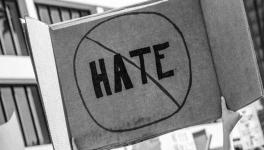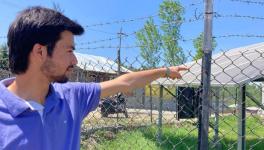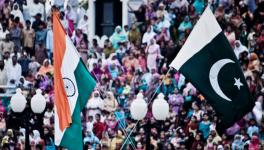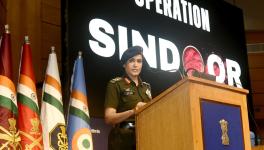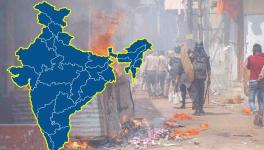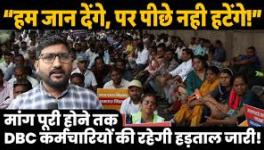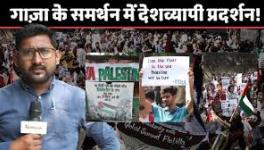Art 370: A Crisis Worse than Festering Hatred
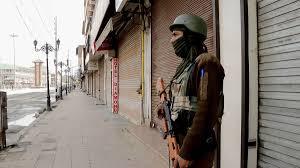
In one stroke, the government has denied Kashmiris their identity and their rights and brought their survival into question. The Valley is under siege. Not a whisper can be heard from that besieged place. Only the military’s writ prevails, like never before: halting movement, suffocating sighs, throttling voices.
Human rights violations have taken place for years in Kashmir but never such a clampdown. Even in the worst of times, basic communications were not stopped. That land, its orchards and meadows, lakes and rivers, belong to the Kashmiri people. The false alibis for their suppression, fitted into well-crafted speeches of politicians, are denying them these rights.
Three years ago, the Bharatiya Janata Party (BJP) made political inroads into the Valley via its alliance with the People’s Democratic Party (PDP). Right away, Kashmiris mistrusted the move. When Sainik colonies were proposed in the Valley, they feared that the they would be the conduits for Rashtriya Swayamsevak Sangh (RSS) cadres. They feared a fate not too different from the Palestinians.
The fact is, the situation in Jammu and Kashmir (J&K) could aggravate, letting foreign players make their presence felt. Arms lobbies have been at work in the Valley for years but the ‘invisible armies’ may now bare their fangs and further complicate the crisis-torn region. The impact would be felt by the entire subcontinent and beyond.
It is only the Kashmiri Muslim who has nowhere to go. Even if the siege is lifted, they have no option to leave. For, the Kashmiri Muslims are not accepted in the rest of the country. They are treated as suspects; even the young who go to different cities to study or work.
Communally-tinged comments are thrown at them and some are even called “terrorists”. Kashmiris do not get rooms in hotels or hostels because the Indian masses are being fed on poisonous propaganda against them. Kashmiris have to report to the police station and only then rent a place to stay.
The police, too, are asked to keep a close watch on Kashmiris to see where they eat, live or travel.
These are not sudden developments. In 2002, the People’s Union for Democratic Rights (PUDR) had released details of the ill-treatment meted out to Kashmiris outside the Valley. This trend has only worsened. Kashmiri students are now targeted and thrashed in educational institutions by their own co-students. The plight of four students enrolled in Rajasthan’s Mewar Chittorgarh region comes to mind. For 0.3 kilos of mutton from the local market, the were treated like suspects in a heinous crime. The rumour that they had purchased beef led to their arrest and public humiliation.
Politicians are aware of the hardships of Kashmiris outside the Valley. The Congress party’s Ghulam Nabi Azad, the National Conference leader Omar Abdullah and the PDP’s Mufti Mohammad Sayeed and Mehbooba Mufti have held meetings with their political counterparts on the issue.
In summer 2006, Azad had asked the chief ministers of 11 states not to harass or take action against traders and students from J&K without first consulting the Director General of Police (DGP) and Additional Director General Police, CID. He had sought to ensure that the innocent do not get harassed on the pretext of questioning if a terrorist act has taken place in their respective states… Despite Azad’s appeals, such attacks continued.
On two occasions this writer interviewed the late Mufti Mohammad Sayeed, once when he was Union Home Minister and later when he was the Chief Minister of J&K. He responded in detail on the attacks on Kashmiris: “I'm aware of the kind of harassment and humiliation some Kashmiris are facing outside the state. I have openly talked at meetings about the dangers of looking at all Indian Muslims with suspicion. Don’t link all Muslims with the likes of Dawood Ibrahim. I have cited instance after instance of the loyalty of the Indian Muslim and yet I fear some polarisation is indeed taking place,” he had said.
There is no platform on which harassed Kashmiris can even lodge a complaint if they face targeted harassment. There are no helpline numbers. It is not just a lack of accountability but the abundance of communally-tinged statements that have created this crisis for Kashmiris outside the Valley.
A large number of Kashmiris study in universities and colleges outside the state, but they have been forced to confine themselves to their own little groups. They feel that the locals are uncomfortable around them.
The treatment meted out to Kashmiris by abrogating Article 370, preceded and followed by the sudden clampdown in the Valley, has relayed a fresh set of apprehensions for all Indian Muslims. They are wary of their identity being diluted, if not wrecked. There are serious apprehensions wrought on the Muslim community by the amendments to the Unlawful Activities (Prevention) Act or UAPA and triple talaq Bills. They view these changes as the government’s way to hound Muslim men.
A shocked Muslim community awaits the next shocker in store for them.
Humra Quraishi is a freelance journalist based in Gurgaon. The views are personal.
Get the latest reports & analysis with people's perspective on Protests, movements & deep analytical videos, discussions of the current affairs in your Telegram app. Subscribe to NewsClick's Telegram channel & get Real-Time updates on stories, as they get published on our website.









